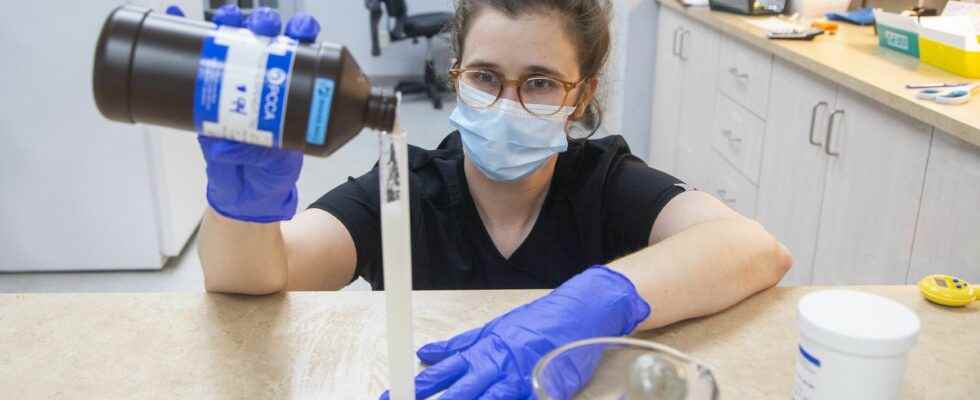
A shortage of children’s pain relievers, including Tylenol and Advil, has led to a surge in business for the handful of London pharmacies that can make their own substitutes, an option for parents desperate to find over-the-counter medication.
Compounding medications involves using ingredients in the form of tablets or powders and turning them into another form of the medication. This can include turning Tylenol or acetaminophen tablets, which are more widely available, into liquid medications children can use.
As information has become more available that compound medications are an alternative to branded medications, demand has increased for services, said Joshua Soares, pharmacy manager at Commissioners Pharmacy.
“We are definitely seeing a lot of prescriptions for children’s Tylenol coming in lately,” he said.
Soares said his pharmacy is fielding dozens of calls a day from parents looking for pain medication for their children or asking about compounding alternatives to branded medications.
“We have to sort of spend a lot of time discussing that with the parents, so they can understand that if their child does become sick, and they need it right away, we can make it for them,” he said.
“But it’s not something that we would want them just to have. . . just in case because the shelf-life of the medication is about two weeks.”
Though some compound pharmacies con make the medication without a prescriptions, they may not be covered by private insurances without one.
Drug shortages in Canada started as early as last spring, but the supply crunch has been exacerbated in recent months by soaring demand amid the spread of influenza, respiratory syncytial virus (RSV) and COVID-19. Lingering pandemic supply chain snags have also contributed to the problem.
Panic buying as news of the lack of availability for the medicines spread compounded the issue, Soares said.
-

Printer emerges from pandemic to mark centennial with more products
-

‘Unprecedented’ hospital crisis prompts series of town hall meetings
“We sort of ended up with a very similar situation that we did with toilet paper back in 2020, where everybody’s trying to secure their own supply and, as a result of that, nobody can find it,” he said.
Though compound medications are an alternative for parents, there are very few pharmacies left in London that can still produce the Tylenol and Advil alternatives.
That’s because new regulations made pharmacies have dedicated rooms, with proper ventilation, for compounding medications as a way to reduce staff and customer exposure to powders and other drugs.
To meet the new requirements that came into effect Jan. 1, Commissioners Pharmacy had to invest about $100,000 in renovations.
“It really limited other pharmacies without dedicated facilities,” Soares said. “They don’t have the ability to meet the new standards.”
In some cases, that’s putting extra pressure on pharmacies that can still produce the medicine.
“Even with the compounding, we’re still having a hard time keeping up with the demand,” said Samer Serhan, owner of TMC Pharmacy and Compounding Center in north London.
“But parents, they are very thankful and appreciative and very relieved, basically, because there’s really no other option at the moment.”
The increase in the number of children ending up at hospitals’ emergency rooms prompted Ontario’s chief medical officer of health, Kieran Moore, on Monday to ask Ontarians to wear masks in all indoor settings to help overwhelmed children’s hospitals and reduce the spread of respiratory illnesses.
Last week, officials with London Health Sciences Center’s Children’s Hospital told The Free Press they were seeing double its typical volume of patients heading to the emergency room.
“We are extremely, extremely busy right now,” Ram Singh, the hospital’s interim co-chief of pediatrics, said at that time. “This is a trend we have seen across the board. Every pediatric hospital in Ontario is seeing the same thing.”
Twitter.com/JuhaatLFPress
– with files from Free Press reporter Jennifer Bieman and Canadian Press
